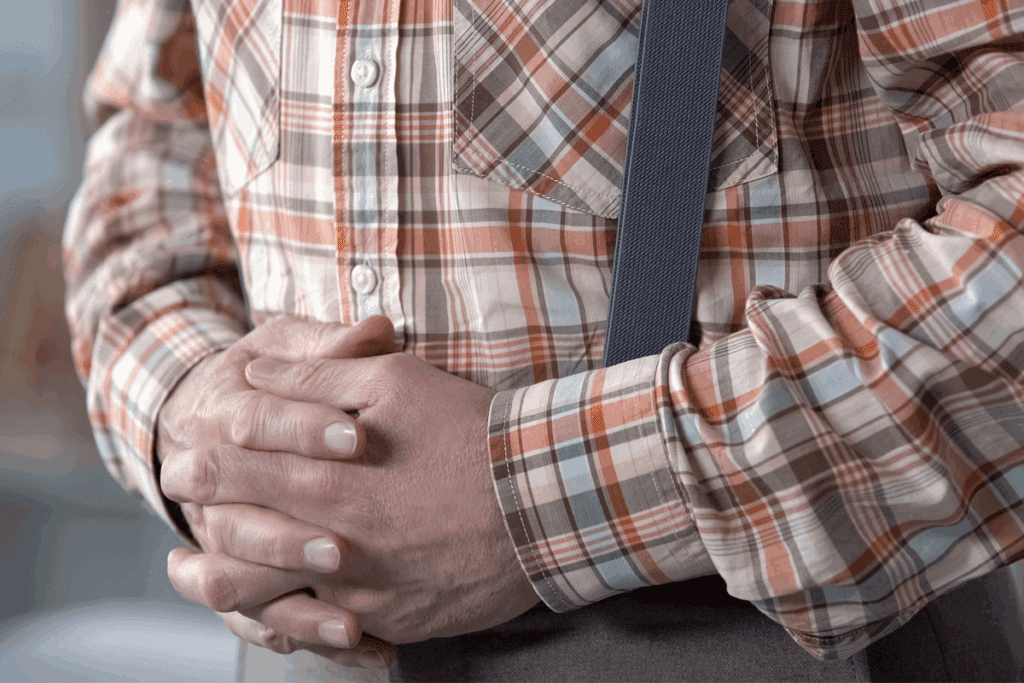
Feeling bloated or gassy without reason can worry you. It’s important to know that hernias can be a cause. Hernias happen when an organ or tissue bulges through a weak spot in the muscle or tissue.Discover does a hernia cause bloating, gas, and what it means for your digestive health.
Studies show hernias are a common diagnosis in primary care. About 1.6 million Americans get diagnosed with hernias each year. Symptoms like bloating, gas, and stomach pain can really affect your life.
Liv Hospital’s team uses the latest diagnostic tools and care with kindness. They help patients understand their symptoms and find good treatment options.
Key Takeaways
- Hernias can cause bloating, gas, and stomach pain.
- Approximately 1.6 million Americans are diagnosed with hernias every year.
- Inguinal, umbilical, and hiatal hernias are common types that may lead to these symptoms.
- Advanced diagnostics and expert care can help manage hernia-related discomfort.
- Understanding the link between hernias and digestive issues is key for effective treatment.
Understanding Hernias: Types and Basic Mechanisms

A hernia happens when an organ or tissue bulges through a weak spot in the muscle or connective tissue. This can occur in different parts of the body, leading to various types of hernias. Each type has its own symptoms and characteristics.
Common Types of Hernias: Inguinal, Umbilical, and Hiatal
There are several types of hernias, but the most common are inguinal, umbilical, and hiatal hernias. Inguinal hernias occur when intestines or abdominal fat push through a weak spot in the lower abdominal muscles. This often causes a bulge in the groin area. Umbilical hernias happen when part of the intestine protrudes through an opening in the abdominal muscles near the navel. Hiatal hernias occur when the stomach bulges up into the chest through an opening in the diaphragm.
Each type of hernia has its own symptoms and complications. For instance, inguinal hernias are more common in men. Umbilical hernias are often seen in infants and obese adults. Hiatal hernias can cause symptoms like heartburn and difficulty swallowing.
How Hernias Develop in the Body
Hernias develop when there is a weakness or tear in the muscle or connective tissue. This weakness can be present at birth or can occur later in life. Factors like aging, injury, or strain can cause this weakness.
The development of a hernia can be influenced by several factors. These include genetic predisposition, obesity, heavy lifting, and chronic coughing or sneezing. Understanding these factors is key to preventing and managing hernias.
Risk Factors for Hernia Development
Several risk factors contribute to the development of hernias. These include:
- Age: Muscle weakness increases with age.
- Obesity: Excess weight puts additional strain on muscles.
- Family History: Genetic predisposition can play a role.
- Heavy Lifting: Frequent heavy lifting can strain abdominal muscles.
- Chronic Coughing or Sneezing: Persistent pressure on abdominal muscles.
| Risk Factor | Description | Impact on Hernia Development |
| Age | Muscle weakness increases with age. | Higher risk of hernia development. |
| Obesity | Excess weight puts additional strain on muscles. | Increased pressure on abdominal muscles. |
| Family History | Genetic predisposition can play a role. | Higher likelihood of developing a hernia. |
By understanding the types of hernias, how they develop, and the associated risk factors, individuals can take preventive measures. They can also seek appropriate medical care when needed.
Does a Hernia Cause Bloating? The Physiological Connection

Hernias and bloating are linked through complex body functions. To grasp this connection, we must look at several factors.
Mechanical Factors Behind Hernia-Related Bloating
Hernias can block the intestine, causing gas and fluid buildup. This blockage can be due to the hernia itself or adhesions around it.
Some hernias, like those in the groin, can press on nearby tissues. This can cause bloating. Hiatal hernias, where the stomach bulges through the diaphragm, also lead to bloating and discomfort.
Research Evidence on Hernia and Bloating Correlation
Studies show hernias can cause bloating, often due to bowel obstruction. Patients with hernias often feel bloated and uncomfortable. Treatment can help ease these symptoms.
A study found many with inguinal hernias experienced bloating and gas. It showed hernias can disrupt normal digestion, causing these symptoms.
| Hernia Type | Prevalence of Bloating | Associated Symptoms |
| Inguinal Hernia | 60% | Bloating, gas, abdominal pain |
| Hiatal Hernia | 70% | Bloating, reflux, chest discomfort |
| Umbilical Hernia | 50% | Bloating, nausea, abdominal tenderness |
How Intestinal Obstruction Contributes to Bloating
Intestinal obstruction is key in hernia-related bloating. A blockage can cause gas, fluid, and stool buildup, leading to bloating and discomfort.
The severity of bloating depends on the blockage’s extent and the person’s health. In severe cases, immediate medical help is needed.
Managing hernia-related bloating often involves addressing the underlying cause, such as surgical repair of the hernia or other interventions to relieve obstruction and restore normal intestinal function.
Inguinal Hernias and Digestive Symptoms
Inguinal hernias can cause bloating and gas. They affect the digestive system in many ways.
Affecting the Digestive Tract
Inguinal hernias happen when tissue bulges through a weak spot in the muscles. This can lead to problems in the digestive tract. For example, if intestine gets trapped, it can cause blockages. This results in bloating, gas, and pain.
Mechanical Factors play a big role in how hernias affect digestion. The hernia can put pressure on nearby structures, disrupting digestion.
Causes and Manifestations of Bloating
Bloating from inguinal hernias comes from trapped gas and blockages. Symptoms include:
- Abdominal discomfort or pain
- Visible swelling or bulge in the groin area
- Increased gas or flatulence
- Nausea or vomiting in severe cases
A study in the Journal of Surgical Research showed relief from digestive symptoms after surgery.
“The repair of inguinal hernias not only alleviates the physical discomfort but also improves digestive function in many patients.”
Distinguishing Inguinal Hernia Gas from Other Conditions
It’s hard to tell the cause of gas and bloating because symptoms are similar. But there are key differences:
| Condition | Common Symptoms | Distinctive Features |
| Inguinal Hernia | Bloating, gas, abdominal pain | Visible bulge in groin, pain upon straining |
| Irritable Bowel Syndrome (IBS) | Bloating, gas, abdominal pain | Chronic nature, absence of visible bulge |
| Gastroesophageal Reflux Disease (GERD) | Heartburn, bloating, gas | Symptoms worsen after eating, acid reflux |
Knowing these differences is key for accurate diagnosis and treatment. If you have ongoing or severe digestive issues, see a doctor for help.
Umbilical Hernias and Their Impact on Digestion
It’s important to understand how umbilical hernias affect digestion. These hernias happen when part of the intestine bulges through an opening in the abdominal muscles near the navel. This can cause bloating, gas, and changes in bowel function.
Clinical Evidence on Umbilical Hernia and Bloating
Studies show umbilical hernias can cause bloating. The bulge can block gas and fluid in the intestine, causing bloating. Many patients with umbilical hernias feel better after surgery.
Key findings from clinical research:
- Umbilical hernias are linked to bloating and discomfort.
- Surgery can greatly reduce bloating and improve digestion.
- Untreated umbilical hernias can cause serious problems like intestinal obstruction.
Effects on Gas and Bowel Function
Umbilical hernias can also mess with bowel function and gas. The bulge can disrupt normal bowel movements, causing constipation or diarrhea. Trapped gas can also cause pain and discomfort.
The impact on bowel function can vary:
- In some cases, the hernia may cause a partial obstruction, leading to intermittent symptoms.
- In other instances, the hernia may not significantly affect bowel function until it becomes incarcerated or strangulated.
Symptom Comparison: Adults vs. Children
Umbilical hernias are common in both adults and children, but symptoms can differ. In kids, these hernias are often not a problem and may go away on their own. In adults, symptoms like bloating and discomfort are more common, and can be severe if the hernia is big or trapped.
| Symptom | Adults | Children |
| Bloating | Common, often severe | Rare, usually mild |
| Gas and Discomfort | Frequent, can be significant | Less common, typically minimal |
Hiatal Hernias: A Major Cause of Upper Digestive Discomfort
Hiatal hernias can really mess with your digestion, causing a bunch of symptoms. They happen when part of your stomach pushes into your chest through a hole in your diaphragm. This can lead to gas, reflux, and bloating in your upper digestive system.
Can Hiatal Hernia Cause Gas and Reflux?
Yes, hiatal hernias can cause gas and reflux. When your stomach bulges into your chest, it can push stomach acid up into your esophagus. This causes heartburn and discomfort. The bulge can also trap gas, making you feel bloated and uncomfortable.
The problem starts with how the stomach and esophagus are connected. This connection can become weak, leading to:
- Incompetence of the lower esophageal sphincter
- Delayed gastric emptying
- Increased pressure on the stomach
These issues are what make hiatal hernias so uncomfortable for people.
The Relationship Between Hiatal Hernias and Post-Meal Bloating
Many people with hiatal hernias experience bloating after eating. When you eat, your stomach gets bigger, and if it’s herniated, it can cause discomfort and bloating. How bad it feels can depend on the size of the hernia and your digestive health.
Several things can make post-meal bloating worse for those with hiatal hernias. These include:
- Eating big or heavy meals
- Consuming foods that are hard to digest
- Lying down after eating
Types of Hiatal Hernias and Their Varying Symptoms
There are different kinds of hiatal hernias, and each can have its own set of symptoms. The main types are:
- Sliding hiatal hernias, where the stomach slides up into the chest
- Paraesophageal hernias, where part of the stomach bulges beside the esophagus
- Mixed hernias, which combine elements of both sliding and paraesophageal hernias
Knowing what kind of hiatal hernia you have is key to finding the right treatment and managing your symptoms.
Can a Stomach Hernia Cause Bloating? Understanding Gastric Hernias
Stomach hernias can lead to bloating and gas trapping. They happen when part of the stomach bulges through a weak spot in the diaphragm or belly wall. This can make daily life uncomfortable.
Mechanisms of Gas Trapping in Stomach Hernias
Gas trapping in stomach hernias is due to the stomach bulge blocking the way. This blockage causes gas to build up, leading to bloating and discomfort. How bad the symptoms are depends on the hernia’s size and how much it blocks the way.
Key factors contributing to gas trapping include:
- The size and location of the hernia
- The extent of stomach protrusion through the hernia
- Associated conditions like gastroesophageal reflux disease (GERD)
Distinguishing Hernia Bloating from Other Digestive Conditions
Figuring out if bloating is from a hernia or another digestive issue is key. Conditions like irritable bowel syndrome (IBS), functional dyspepsia, and gastroparesis can cause similar symptoms. So, it’s important to tell them apart.
| Condition | Common Symptoms | Diagnostic Features |
| Stomach Hernia | Bloating, gas, abdominal pain | Visible hernia, imaging studies |
| IBS | Abdominal pain, bloating, altered bowel habits | Symptom pattern, exclusion of other conditions |
| Functional Dyspepsia | Chronic pain or discomfort in the upper abdomen | Normal endoscopy, symptom criteria |
Patient Experiences with Stomach Hernia Bloating
People with stomach hernias often feel a lot of discomfort from bloating and gas. The severity of symptoms can vary a lot. Some people might only feel a little discomfort, while others might find it very hard to live with.
It’s important to understand what patients go through to give them the right care. Treatment can range from making lifestyle changes and eating differently to surgery in serious cases.
Will a Hernia Cause Gas and Flatulence? Exploring the Connection
It’s important to know how hernias affect gas in the intestines. This helps manage symptoms. Hernias can mess with how gas moves, causing more gas and flatulence.
Disruption of Normal Gas Movement
Hernias can block gas in the intestines. This blockage can cause gas to build up. This leads to discomfort and flatulence.
The type of hernia affects how bad the symptoms are. For example, inguinal, umbilical, or hiatal hernias can have different effects.
The blockage from a hernia can trap gas. This makes the belly bloat and feel uncomfortable. Diet and hernia size can make it worse.
Clinical Observations on Hernia and Flatulence
Research shows hernias can make flatulence worse in some people. A hernia can change how gas moves in the intestines. This can lead to more gas.
Fixing hernias with surgery can help with gas and flatulence. This shows a clear link between hernias and gas problems.
Managing Excessive Gas Associated with Hernias
Dealing with gas in hernia patients involves diet changes and sometimes surgery. Eating less gas-producing food and smaller meals can help. This can ease symptoms.
- Avoid foods known to produce gas, such as beans and cabbage
- Eat smaller, more frequent meals to reduce digestive load
- Consider surgical repair if the hernia is causing significant symptoms
Understanding the link between hernias and gas helps doctors manage symptoms better. This makes treatment more effective for patients.
Diagnosing Hernia-Related Bloating and Gas
To find out if bloating and gas are due to a hernia, doctors use many tools and methods. They look for signs of a hernia when patients have these symptoms.
Diagnostic Approaches for Suspected Hernias
First, doctors do a detailed physical check. They ask patients to cough or strain to see if a hernia is present.
They also ask about the patient’s health history. This includes the symptoms’ details and what makes them better or worse.
Imaging Tests Used to Confirm Hernia Diagnosis
Imaging tests are key to confirming a hernia. The most common ones are:
- Ultrasound: Uses sound waves to see inside the body.
- Computed Tomography (CT) scan: Uses X-rays to show detailed body images.
- Magnetic Resonance Imaging (MRI): Uses a magnetic field and radio waves for detailed images.
These tests help doctors see the hernia and its size and location.
Differentiating Hernia Symptoms from Other Digestive Disorders
It can be hard to tell if bloating and gas are from a hernia or another digestive issue. Conditions like IBS, gastroparesis, and functional dyspepsia can have similar symptoms.
To accurately diagnose, doctors use a combination of physical exams, medical history, and imaging tests.
Treatment Options for Hernia-Related Bloating and Gas
People with hernia-related bloating and gas have many treatment options. The right choice depends on the hernia type, its severity, and the patient’s health.
Surgical Interventions for Symptom Relief
Surgery is often the best way to treat hernia-related bloating and gas. It can fix the hernia, ease symptoms, and prevent serious problems. Laparoscopic surgery is a less invasive method. It uses small cuts and a camera for the repair.
This method can lead to less pain and faster recovery times.
“Surgical repair is often the most definitive treatment for hernias causing significant symptoms,” according to medical professionals.
Non-Surgical Management of Hernia Symptoms
Not every hernia needs surgery right away. Some may be managed without surgery. This means watching the hernia for changes or worsening symptoms.
Changing your lifestyle can also help. Avoiding heavy lifting and managing your weight can ease symptoms.
- Avoiding strenuous activities
- Managing constipation through diet and hydration
- Using supportive garments if recommended by a healthcare provider
Dietary Modifications to Reduce Hernia-Related Bloating
Changing your diet can help with hernia-related bloating and gas. Following a low-FODMAP diet or avoiding gas-causing foods can help. Eating smaller, more frequent meals can also ease symptoms.
As one medical expert notes, “Dietary adjustments can significantly impact the severity of hernia-related symptoms.” Keeping a food diary can help find and avoid trigger foods.
Conclusion: When to Seek Medical Attention for Hernia Symptoms
Knowing when to get medical help for hernia symptoms is key to avoiding serious problems. Hernias can make you feel bloated and gassy, which can really affect your life. If your symptoms get worse or you notice signs of trouble like incarceration or strangulation, you need to see a doctor right away.
It’s important to know when to get medical help for hernia symptoms. If you have severe stomach pain, vomiting, or trouble going to the bathroom with hernia symptoms, get help fast. Quick medical care can make a big difference for people with hernia problems.
Getting medical help for hernia symptoms is a smart move to take care of your health. By understanding the dangers of not treating hernias and the benefits of early medical care, you can make better choices for your well-being.
FAQ
Can a hernia cause bloating and gas?
Yes, hernias can lead to bloating and gas. This happens because of mechanical issues and intestinal blockages. These problems can mess up how we digest food.
What types of hernias are most likely to cause digestive symptoms?
Inguinal, umbilical, and hiatal hernias often cause stomach discomfort. This includes bloating and gas.
How does an inguinal hernia cause bloating?
An inguinal hernia can put pressure on the digestive tract. This pressure can mess up normal bowel function. As a result, gas builds up.
Does an umbilical hernia cause bloating?
Yes, umbilical hernias can lead to bloating. This is more likely if they become trapped or cut off blood flow. This can block the intestines.
Can hiatal hernias cause gas and reflux?
Yes, hiatal hernias can cause gas, reflux, and bloating. They allow stomach acid to flow back into the esophagus. This disrupts digestion.
How can I distinguish hernia bloating from other digestive conditions?
To figure out if hernia bloating is the issue, you need a thorough medical check-up. This includes imaging tests and a physical exam. It helps rule out other digestive problems.
Can a stomach hernia cause bloating?
Yes, stomach hernias can cause bloating. This happens because gas gets trapped and the intestines get blocked. This leads to discomfort and digestive symptoms.
Will a hernia cause gas and flatulence?
Yes, hernias can cause gas and flatulence. They disrupt normal gas movement in the intestines. This leads to gas buildup.
What are the treatment options for hernia-related bloating and gas?
Treatment options include surgery, non-surgical methods, and changing your diet. These can help reduce bloating and gas from hernias.
Can dietary changes help alleviate hernia-related bloating?
Yes, changing your diet can help. Avoiding certain foods and eating smaller meals can reduce bloating and discomfort from hernias.
When should I seek medical attention for hernia symptoms?
If you have ongoing or severe hernia symptoms, like bloating and gas, see a doctor. This is to prevent serious problems and get the right treatment.
References
Huttinger, R. (2023). Spigelian hernia. In StatPearls. National Library of Medicine. Retrieved from https://www.ncbi.nlm.nih.gov/books/NBK538290/



































